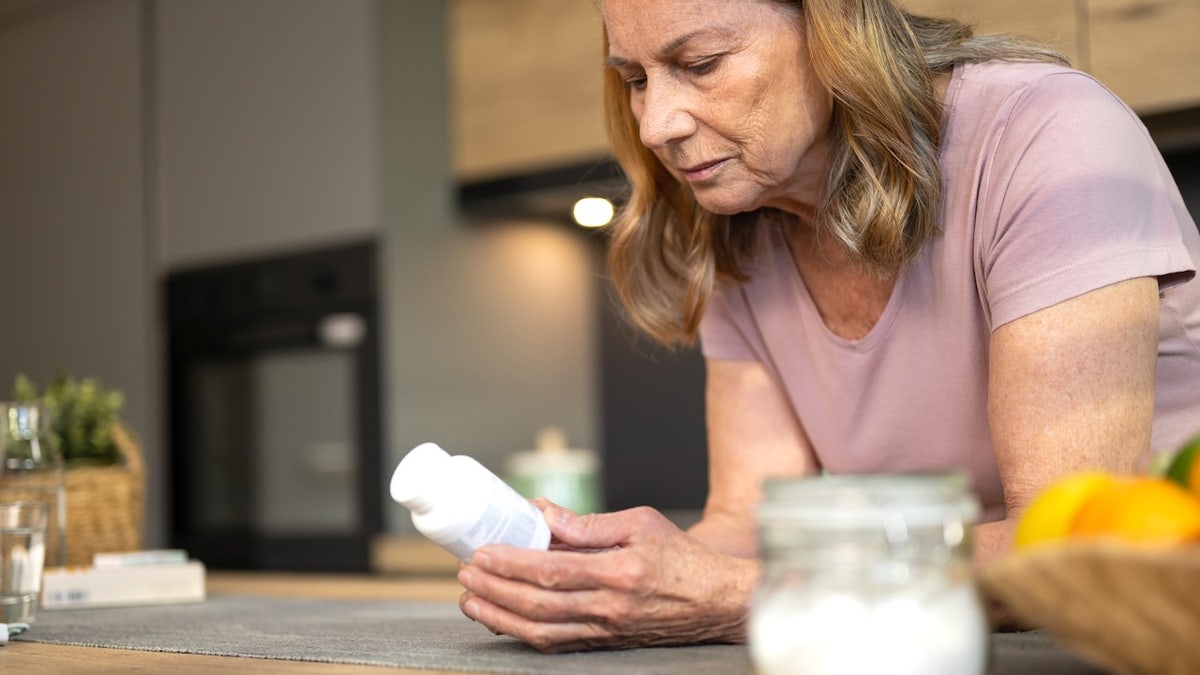Newou can hearken to Fox News articles!
Previous research have linked frequent nutritional vitamins to slowing down getting old. And now it seems that a brand new Harvard analysis is rising to verify these findings.
The research, revealed within the American Journal of Clinical Nutrition, discovered that taking every day vitamin D capsules doesn’t shorten telomeres, a attribute of getting old.
Common every day nutritional vitamins can decelerate organic getting old, main research recommend
As age will increase, telomeres might turn out to be shorter and will improve the chance of reducing well being and mortality, earlier research have proven.
Research additionally means that larger ranges of vitamin D within the blood are related to longer telomeres.

Previous research have linked frequent nutritional vitamins to slowing down getting old. And now it seems that a brand new Harvard analysis is rising to verify these findings. (istock)
In this newest randomized trial, roughly 1,000 folks over the age of fifty have been divided into two teams. One group took 2,000 International Units (IU) Vitamin D tablets every day, and the opposite group took placebo capsules.
After 4 years, folks taking vitamin D confirmed lower than half of the telomere shortening than the placebo group.
Vitamin D teams additionally suffered fewer autoimmune ailments and decreased irritation markers.
Common nutritional vitamins proven to cut back autoimmune ailments

Fatty fish, together with salmon, sardines, tuna and wild mushrooms, are different sources of vitamin D, consultants mentioned. (istock)
“Vitamin D reduces irritation and is the principle explanation for persistent ailments of telomere shortening and getting old,” she mentioned.
Vitamin D suggestions
According to Manson, the problem of what constitutes the “correct” blood focus of vitamin D is a “controversial matter.”
In this research, the group discovered that 2000 IUs per day was “very protected” with no unwanted side effects or antagonistic occasions.
To keep wholesome, eat extra meals with vitamin D, diet consultants advise
“The blood focus of deficiencies and really helpful blood ranges fluctuate by tissue, lab and nation. This is without doubt one of the explanation why we’ve got doubts concerning the usefulness of the check,” Manson mentioned.
The US preventive providers job power and most specialist societies within the US don’t suggest common screening of vitamin D blood ranges or the routine use of vitamin D dietary supplements, researchers famous.
“Vitamin D suppresses irritation, and is a significant explanation for telomere shortening and a persistent illness of getting old.”
“The National Academy of Medicine recommends 600 IU of Vitamin D per day for adults over 70. 800 IUs over 70 say these intakes meet the necessities of the overwhelming majority of the inhabitants,” she mentioned.
“However, current tips from the Endocrine Society recommend that vitamin D dietary supplements could also be helpful for adults over the age of 75, infants and kids, pregnant girls, and people with a prognosis of prediabetics, however don’t specify a selected dose.”

In this research, the group discovered that 2000 IUs per day was “very protected” with no unwanted side effects or antagonistic occasions. (istock)
Manson mentioned that supplementing vitamin D between 1000 and 2000 IU/day is “very cheap” for anybody involved about getting correct vitamin D from meals or out of doors time.
“In the US, meals like dairy merchandise, cereals and orange juice are sometimes fortified with vitamin D, so checking diet labels can assist you make a greater resolution about which meals to purchase,” she suggested.
“Fat fish equivalent to salmon, sardines, tuna and wild mushrooms are different sources.”
Click right here to get the Fox News app
Groups at excessive danger for vitamin D deficiency embody those that stay in nursing properties, these with resorption situations equivalent to clones and celiac illness, those that are being handled for osteoporosis and different bone well being points, and people with main dietary restrictions equivalent to extreme lactose intolerance, in response to Manson.
“[People in these groups] You want to speak to your physician about testing your vitamin D blood ranges and taking vitamin D dietary supplements,” she really helpful.

Groups at excessive danger for vitamin D deficiency embody these dwelling in nursing properties, these with resorption situations equivalent to clones and celiac illness, and people present process remedy for osteoporosis and different bone well being points. (istock)
Doctors identified that vitamin metabolism is “strickenly regulated” within the physique, so that they solely want small to medium vitamin D for his or her well being.
“Not essentially higher than that, and really excessive doses, equivalent to above 10,000 IU/D, could also be linked to hypertension or urinary calcium ranges and toxicity,” she warned.
Click right here to join our well being e-newsletter
Manson emphasised that taking dietary supplements will not be a substitute for a nutritious weight-reduction plan and a wholesome way of life.
“It’s a lot simpler to pop the capsule than bodily lively outdoors and maintaining a healthy diet, however these way of life components usually tend to preserve you wholesome and cut back your danger of heart problems, most cancers, kind 2 diabetes and different persistent ailments,” she mentioned.
“Not essentially higher than that.”
Manson mentioned that if the pores and skin normally supplies sufficient daylight publicity to vitamin D, going out for a 15-minute stroll per week could cause your pores and skin to be uncovered to loads of daylight.
“More vital to your well being is exercising outside, together with lively strolling, jogging, enjoying sports activities.”
I sit up for future analysis
“The outcomes are thrilling, however we consider it is very important replicate these leads to one other randomized trial earlier than altering the overall tips for vitamin D consumption,” Manson mentioned.
For well being articles, please go to www.foxnews.com/well being
This research was supported partly by the National Heart, Lung and Blood Institute, National Cancer Institute, and the National Center for Complementary Integrated Health.

